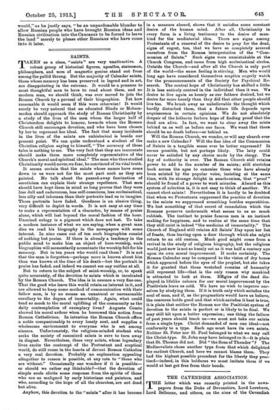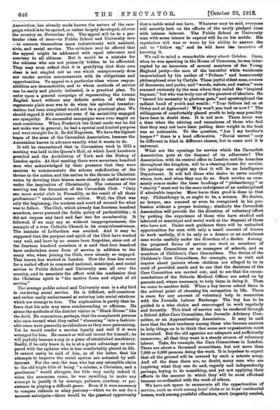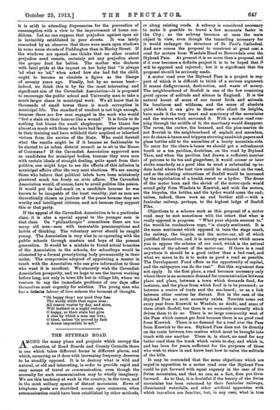THE CAVENDISH ASSOCIATION.
THE letter which was recently printed in the news- papers from the Duke of Devonshire, Lord Loreburn, Lord Selborne, and others, on the aims of the Cavendish
Association, has already made known the nature of the cam- paign which is to be opened, or rather largely developed, all over the country on November 5th. The appeal will be to a par- ticular class of men—to Public School and University men —to concern themselves more industriously with national, civic, and social service. The criticism may be offered that the appeal might be addressed with equal relevance and courtesy to all citizens. But it would be a mistake for the citizens who are not primarily bidden to be affronted. They may even reflect that it is gratifying that their own class is not singled out as one which conspicuously does not render service commensurate with its obligations and opportunities. To appeal to a particular class whose respon- sibilities are demonstrable, and to whom methods of service can be easily and plainly indicated, is a practical plan. To enter upon a general campaign of regenerating the human English heart without any definite notion of what the regenerate plain man was to do when his spiritual transfor- mation had been completed would not be a practical plan. We should regard it with mistrust even if its amiability engaged our sympathy. No successful campaigns were ever waged on such conditions. When Frederick the Great made war he did not make war in general ; he had a special and limited purpose and went straight for it. So did Napoleon. We have the highest hopes of the aims of the Cavendish Association, because the Association knows in advance exactly what it wants to do.
It will be remembered that in Coronation week in 1911 a meeting was held in the Queen's Hall, at which Lord Loreburn presided and the Archbishop of York and the Bishop of London spoke. At that meeting there were seventeen hundred men who acknowledged by their presence that they were anxious to commemorate the solemn rededication of the throne to the nation and the nation to the throne in Christian union by devoting their leisure more closely to useful services under the inspiration of Christianity. The outcome of the meeting was the formation of the Cavendish Club. " Only one more social club in Piccadilly, as the result of all these professions ! " exclaimed some critics. Well, the Club was only the beginning, the nucleus and court of council for what was to follow. The Club, which already has fourteen hundred members, never pursued the futile policy of perfectibility ; it did not impose any hard and fast test for membership. It followed, if we may say so without ivappropriatenesa, the example of a true Catholic Church in its comprehensiveness, The mistake of Lollardism was avoided. And it may be supposed that the purpose and spirit of the Club have worked very 'sell, and have by no means been forgotten, since out of the fourteen hundred members it is said that four hundred have undertaken some form of service in addition to the many who, when joining the Club, were already so engaged. This leaven has worked in London. Now the time has come for a united effort to commend national, municipal, and social service to Public School and University men all over the country, and to associate the effort with the confession that the Christian spirit is " the motive force and object of all service."
The average public school and University man is a shy bird in rendering social service. He is diffident, self-conscious and rather easily embarrassed at entering into social relations which are strange to him. The explanation is partly that he fears that his acts may seem condescending or officious. He shuns the methods of the district visitor in " Bleak House " like the deviL He remembers, perhaps, that the complacent persons who once turned what they called " slumming " into a fashion. able craze were generally as ridiculous as they were patronizing. Yet he would render a service loyally and well if it were arranged for him. He cannot or will not invent for himself ; he will joyfully become a cog in a piece of established machinery. Really, if he only knew it, he is at a great advantage as com- pared with the agitator who is less comfortably placed in life. It cannot easily be said of him, as of the latter, that his attempts to improve the social system are actuated by self- interest. For the rest, the man who has any ostensible claim to the old triple title of being " a scholar, a Christian, and a gentleman" would abrogate the title very easily indeed if, when the summons came, he was unwilling to make any attempt to justify it by courage, patience, courtesy, or per- sistence in playing a difficult game. Even if it were necessary to conquer ridicule or allay jealousy—which we do not for a moment anticipate—there would be the greatest opportunity that a noble mind can have. Whatever may be said, everyone will secretly look on the efforts of the newly pledged class with intense interest. The Public School or University man with some leisure to expend will be on his mettle. His reputation will wax or wane by his ability to answer the call to " follow up," and he will have the incentive of knowing it.
We call to mind a remarkable story about Cobden. Once, when he was speaking in the House of Commons, he was inter- rupted by an incursion of several members of the Young England party—the men of the beautiful white waistcoats immortalized by the author of "Pelham" and humorously philosophized over by Carlyle. These joyful eldest sons, owners of demesnes, and parks, and "woods, waters, and wastes," were scanned curiously by the man whom they called the "inspired bagman," but who was truly one of the greatest of idealists. He " turned his necessity to glorious gain," and apostrophized the radiant band of youth and wealth : "Your fathers led us at Crecy and at Agincourt ! Why won't you lead us now ? " The willingness of comfortably placed youth to help may possibly have been in doubt then. It is not now. There never was a time when the stirring and uneasiness of those who feel that they may not have been pulling their weight in the boat was so noticeable. To the question, "Am I my brother's keeper ?" there is a loud affirmative. "Social unrest" may be different in kind in different classes, but in some sort it is nniversaL What are the openings for service which the Cavendish Association puts at the disposal of its adherents ? The Association, with its central office in London and its branches throughout the kingdom, will be a clearing-house for service. Or perhaps one might say that it will be an Intelligence Department. It will tell those who desire to serve exactly where, how, and when they can do so. Such service as com- monly comes under the loose headings of " philanthropy " or "charity " must not be the mere indulgence of an undisciplined if admirable impulse. More harm than good is done in that way. Philanthropy is, or ought to be, a science. No doctor, no lawyer, can succeed or even be recognized in his pro- fession without a proper training ; similarly the Cavendish Association will provide for the direction of voluntary effort by putting the experience of those who have studied and laboured at municipal and social work at the disposal of those who have not. Under such guidance there will be unlimited opportunities for men with only a small amount of leisure to work usefully, if it be only as a dresser or an ambulance man works usefully under the direction of a doctor. Among the proposed forms of service are work as members of Education Committees or as managers of schools, and as members of Children's Care Committees. The duties of the Children's Care Committees, for example, are to visit and inquire about parents whose children are alleged to be in need of provided meals and to see that the decisions of the Care Committee are carried out; and to see that the recom- mendations of the Schools Medical Officer are acted on by parents and, where necessary, to help them in doing it. Then we come to another field. When a boy leaves school there is the critical point of choosing his occupation in life. There is room for any amount of voluntary help in connexion with the Juvenile Labour Exchange. The boy has to be guided to a wise choice and encouraged to work regularly and honestly. This kind of service can be rendered through a School After-Care Committee, the Juvenile Advisory Com- mittee, or an Apprenticeship Association. It may be said here that the first tendency among those who become anxious to help things on is to think that some new orgaalzation must be created. But the old agencies are adequate and sufficiently numerous ; all that they want is a steady stream of voluntary labour. Take, for example, the Care Committees in London. There are about a thousand committees, but not more than 7,000 or 8,000 persons doing the work. It is hopeless to expect that all the ground will be covered by such a minute army. And all the time there are, no doubt, many men who are inquiring what they can do and, vaguely and independently perhaps, trying to do something, and yet not applying their efforts in the manner in which they will be most effectual because co-ordinated with the work of others.
We have not space to enumerate all the opportunities of service, such as work among boys' clubs or in buys' residential homes, work among youthful offenders, work (urgently needed, it is said) in attending dispensaries for the prevention of consumption with a view to the improvement of home con- ditions. Let no one suppose that prejudice against open air is invincibly established in poor streets. It was lately remarked by an observer that there were more open windows in some mean streets of Paddington than in Harley Street. If the windows are opened one thinks that no other crusted prejudice need remain, certainly not any prejudice about the proper food for babies. The mother who declares with fatal pride at the inquest on her baby that "it always 'ad what we 'ad," when asked how she had fed the child, ought to become as obsolete a figure as the Gamps of seventy years ago. Finally, but by no means least— indeed, we think this is by far the most interesting and significant aim of the Cavendish Association—it is proposed to encourage the public school and University man to take a much larger share in municipal work. We all know that in thousands of small towns there is much corruption in municipal life. The standard of conduct is not high enough, because there are few men engaged in the work who would "feel a stain on their honour like a wound." It is futile to do nothing but blame the small shopkeeper. The blame lies almost as much with those who have bad far greater advantages in their training and have withheld their acquired or inherited virtues from the service of the State. Who could foretell what the results might be if it became as fashionable to be elected to an urban district council as to it in the House of Commons ? If the Cavendish Association approved men as candidates for municipal bodies, because they were men with certain ideals of straight dealing, quite apart from their politics, one might hope to see the effects of this infusion in municipal affairs after the very next elections. We are among those who believe that political labels have been mistakenly plastered much too freely on civic affairs. The Cavendish Association would, of course, have to avoid politics like poison.
It would put its ball-mark on a candidate because he was known to be incapable of the least venality, just as men are theoretically chosen as justices of the peace because they are worthy and intelligent citizens, and not because they support this or that party.
If the appeal of the Cavendish Association is to a particular class, it is also a special appeal to the younger men in that class. On " philanthropic " committees there are too many old men—men with immutable preconceptions and habits of thinking. The voluntary server should be caught young. The Association is very wise in co-operating with the public schools through masters and boys of the present generation. It would be a mistake to found actual branches of the Association in the schools, for schoolboys would be alienated by a formal proselytizing body permanently in their midst. The compromise adopted of appointing a master in touch with the Association who can give information to those who want it is excellent. We sincerely wish the Cavendish Association prosperity, and we hope to see the leaven working before long, not only in town life but in village life, where we venture to say the immediate problems of our days offer themselves most urgently for solution. The young man who has a defiatito labour of love solaces the torment of thought.
"Oh happy they! nor need they fear The wordy strife that rages near : All reason wastes by day, and more, Will instinct in a night restore. O happy, so their state but give A clue by which a man can live; O blest, unless 'tie proved by fact A dream impossible to act."
















































 Previous page
Previous page